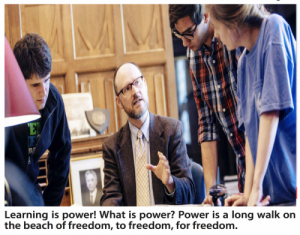Citing the year’s “completely bonkers” major events, history textbook writers around the country can’t wait to start diving into 2016.

“Oh, man, where to begin?” said historian Maya Creel, adding that she might get started off on “pretty much the only bright note” of the Cubs’ World Series win, and then proceed to get more depressing from there. “Zika, Brexit, Standing Rock – the diversity of the types of terribleness of these major 2016 events is enough material to keep me busy writing for months.”
Divisions are rising within the community over which awful development to spend the most pages on in future textbooks. Some writers are most excited about tackling the rise of international terrorism, like the attacks in Brussels and Istanbul, while others, like Creel, can’t wait to document the rise of white nationalism in the United States: “It’s completely horrifying how blatant xenophobes have been getting a major platform in politics and the media this year, and I can’t wait to get my hands dirty ripping these assholes a new one in my textbook.”
“Gonna spend at least a chapter on that one,” she finished.
Historian Vernon Gomez is prepping to wade into the mess of police brutality in the United States. “I’ll have to ground my historical analysis of 2016 in a study of race relations ever since the country was founded,” he said. “It’s going to be tricky to summarize how these types of attacks have been going on for centuries but are somehow only now breaking into the national consciousness, but I’m so down for the challenge.”
“I’ll start with Orlando, and segue into a larger discussion of LGBTQ marginalization in the country in 2016,” said American Studies professor Christine Palmeiro, adding that she would be remiss to ignore other tragedies like the water crisis in Flint, Michigan or the Louisiana floods. “Got to briefly mention the North Korea nuclear tests and the Dallas police shootings, too.”
“Oh, fuck me,” she added with a wince. “I forgot Trump.”
At press time, textbook writers across the country were conceding that a lot of things presumably happened in places outside the U.S. and Europe, too.
